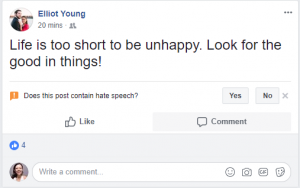Organization Trends
Is Facebook Enlisting Users To Police “Hate Speech”?


Big Brother isn’t just watching you. He’s recruiting you.
On May 1st some Facebook users may have noticed a change to their newsfeed.
For at least part of the day, underneath every post from friends asking for recommendations for a good brunch spot to sharing pictures of their cat was a small exclamation point asking users: “Does this post contain hate speech?”
As quickly as they appeared, the little prompts seemed to evaporate. A screenshot shows what the company claimed was an errant test of a new feature built into Facebook’s timeline. Perhaps this is a continuation of the mea-culpa campaign following the Cambridge Analytica scandal.
The effect—short-lived though it was—was chilling. Inviting anyone to report “hate speech,” which has no legal definition, opens the platform to so-called “brigading,” where organized groups can target and silence a user they don’t like. Now that everyone could be encouraged to report hate speech, the feature can be weaponized by organized interests—think Media Matters drones or basement-dwelling far-right extremists—to silence disagreement or even undermine political campaigns. Unfriending or unfollowing people with whom you don’t want to associate used to be the preferred method of filtering your social media. In the wrong hands, this could turn into a “user-generated” purge of users and viewpoints.Facebook’s utopian attempt to ban hate will overwhelm the humans who work at Facebook. And that assumes that Facebook attempts to adjudicate “hate speech” honestly. Left-wing groups like the Southern Poverty Law Center (SPLC) have tarred mainstream conservative organizations as “hate groups” in order to advance their political agenda; unsurprisingly, SPLC claims that only a fraction of the groups it considers to be hate groups are removed from the social network. If Facebook wanted to make its job easier, it could simply adopt the list of a group like SPLC and act as a partisan censor.
To be clear, Facebook isn’t a government entity and it is free to operate however it wishes. But after Zuckerberg’s trip to Capitol Hill last month, when—in what is a longstanding tradition of established mega-conglomerates–he rejected free markets and enterprise by encouraging Congress to consider regulating social media, Facebook appears prepared to do whatever it must to appease influencers and policymakers.
The good news is that the reporting feature seems to have vanished. But if and when it reappears, will Facebook be staffed to handle all the “hate speech” it will then have to police—and who will define what is policed? Let’s hope we don’t have to find out.




